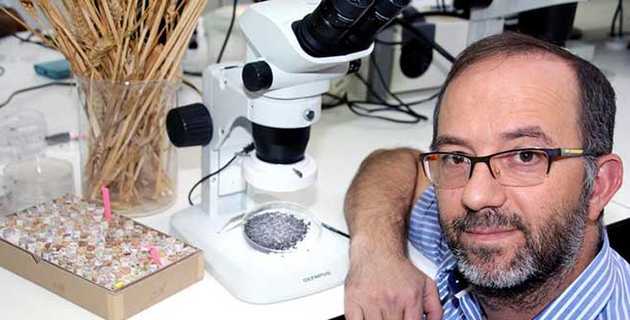Israeli archaeologists have unearthed evidence of early small-scale agricultural cultivation at Ohalo II, a 23,000-year-old hunter-gatherers’ sedentary camp on the shore of the Sea of Galilee.
 Prof Ehud Weiss of Bar-Ilan University
Prof Ehud Weiss of Bar-Ilan University
Ohalo II is located 5.5 miles (9 km) south of the modern city of Tiberias, and was discovered in 1989 when the level of the lake plummeted.
Excavations at the site exposed six brush hut dwellings, a human grave, copious and well-preserved remains of both animal and plant foods, beads from the Mediterranean Sea, as well as evidence of flint tool manufacture and use.
“The plant remains from the site were unusually well-preserved because of being charred and then covered by sediment and water which sealed them in low-oxygen conditions,” said Prof Ehud Weiss of Bar-Ilan University in Ramat-Gan, Israel, team leader and senior author of a paper published in the journal PLoS ONE.
“Due to this, it was possible to recover an extensive amount of information on the site and its inhabitants – which made this a uniquely preserved site, and therefore one of the best archaeological examples worldwide of hunter-gatherers’ way of life. Here we see evidence of repeated sowing and harvesting of later domesticated cereals.”
In the Ohalo II dwellings was a particularly rich assemblage of some 150,000 plant remains, showing that the residents gathered over 140 different plant species from the surrounding environment.
Among these, the archaeologists identified edible cereals – such as wild emmer, wild barley, and wild oats.
These cereals were mixed with 13 species of so-called proto-weeds – ancestors of the modern-day weeds known to flourish in cultivated, single-crop fields – indicating that they grew and were subsequently unintentionally gathered together.
“Because weeds thrive in cultivated fields and disturbed soils, a significant presence of weeds in archaeobotanical assemblages retrieved from Neolithic sites and settlements of later age is widely considered an indicator of systematic cultivation,” said co-author Prof Marcelo Sternberg of Tel Aviv University.
The archaeologists also found a grinding slab – a stone tool with which cereal starch granules were extracted – as well as a distribution of seeds around this tool, reflecting that the cereal grains were processed into flour. This flour was probably used to make dough, maybe by baking it on an installation of flat stones, found just outside one of the shelters.
Until now, scientists believed farming was invented 12,000 years ago in the Cradle of Civilization – Iraq, the Levant, parts of Turkey and Iran – an area that was home to some of the earliest known human civilizations. The researchers’ discovery offers the first evidence that trial plant cultivation began far earlier – some 23,000 years ago.
“While full-scale agriculture did not develop until much later, our study shows that trial cultivation began far earlier than previously believed, and gives us reason to rethink our ancestors’ capabilities. Those early ancestors were more clever and more skilled than we knew,” Prof Sternberg said.

Las opiniones vertidas por nuestros colaboradores se realizan a nivel personal, pudiendo coincidir o no con la postura de la dirección de Protestante Digital.
Si quieres comentar o